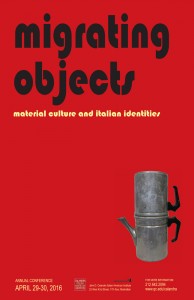TML at John D. Calandra Italian American Institute, New York
07 Mar 2016, by in News
MIGRATING OBJECTS
Material Culture and Italian Identities
April 28-30, 2016 JOHN D. CALANDRA ITALIAN AMERICAN INSTITUTE
Queens College, City University of New York 25 West 43rd Street, 17th floor (between 5th and 6th Avenues), Manhattan.
Loredana Polezzi, Margaret Hills de Zàrate and Carlo Pirozzi (TML Team) will be participating at the annual conference at John D. Calandra Italian American Institute, New York on April 28-30, 2016. The conference is entitled Migrating Objects: Material Culture and Italian Identities and focuses on material culture in the contexts of Italy, its colonies, and its diasporic communities and on new approaches that draw from the social sciences and the humanities, discovering hitherto unexplored perspectives and expressions.
Please see the Final programme.
Titles & Abstracts:
Margaret Hills de Zàrate, ‘Moving Objects: Memory and Affect in Transgenerational Italian Narratives from South America’
Drawing upon current developments in the field of material and visual culture and recent participatory ethnography research undertaken in Buenos Aires, Argentina, and Saõ Paolo, Brazil, this presentation focuses on the use of objects and the practices associated with them as a vehicle of cultural translation. Translation is conceived as relating to processes that are not exclusively inter-lingual (between languages) but also intermedial (between media). The relationship between the visual and the verbal and the movement from one plane of presentation or representation to another is examined with reference to workshops and interviews undertaken with transgenerational Italian migrants in South America involving objects and the memories, emotions and insights emerging in these explorations.
Carlo Pirozzi, ‘Exploring Italian Identity through Cultural Materials Collected in a New Transnational Media Collection’
The Media Collection pages form an essential part of the website of the ‘Transnationalizing Modern Languages project’. The TML project aims to gather and analyse cultural materials produced in recent history by Italian communities abroad and new migrant communities in Italy, tracing the ways in which these materials tell the stories of different types of linguistic and cultural translation, offering insights into how people respond to a bilingual or multilingual environment and, in so doing, challenge and reformulate notions of national identity. The study of this rich collection of material from around the world presents many challenges for the TML Team researchers. In particular, they face problems such as how to present the materials online, how to ‘immobilize’ this ‘mobile material’ which is made up largely of ‘migrant objects’. Additionally, we need to reflect on how to narrate the stories of these materials, how to create or maintain contacts with the communities who produced them, and how to renew their meaning by placing them in a new transnational context. The talk focuses on the methods used to build the Media collection and its aims and outcomes. It also presents a small number of case studies related to the analysis of cultural materials produced by the Italian community in Scotland and the artistic projects inspired by them.
Loredana Polezzi, ‘Re-Framing Photographs’
The paper will examine the complex history of a collection of 700 photographs taken by Duilio Peruzzi – a US citizen, migrant, geographer, academic, traveller… – in 1950s Tuscany. The photographs are themselves the product of complex, multiple trajectories of personal and family migration. Their subsequent history is a tale of intricate framings and re-framings (both literal and metaphorical), carried out on an individual as well as a collective basis. Over the years, single images and groups of them changed value and position as they were put to different uses: as scientific documents, personal memories, testimonies of social as well as geographical mobility, or collective self-ethnography. By analysing the complex mobilities which have affected the production and reception of these photographs, the paper will discuss translation as a key transformative process in the life of migrant objects and in the formation of transnational memory networks. As with all good translation, migrant objects do not remain the same as they cross space, time and languages. Their transformations and appropriations, however, should not be read in terms of authenticity and faithfulness (e.g. to an original authorial intention), but rather as a form of productive enrichment, re-location and re-allocation of meaning.


Sorry, the comment form is closed at this time.